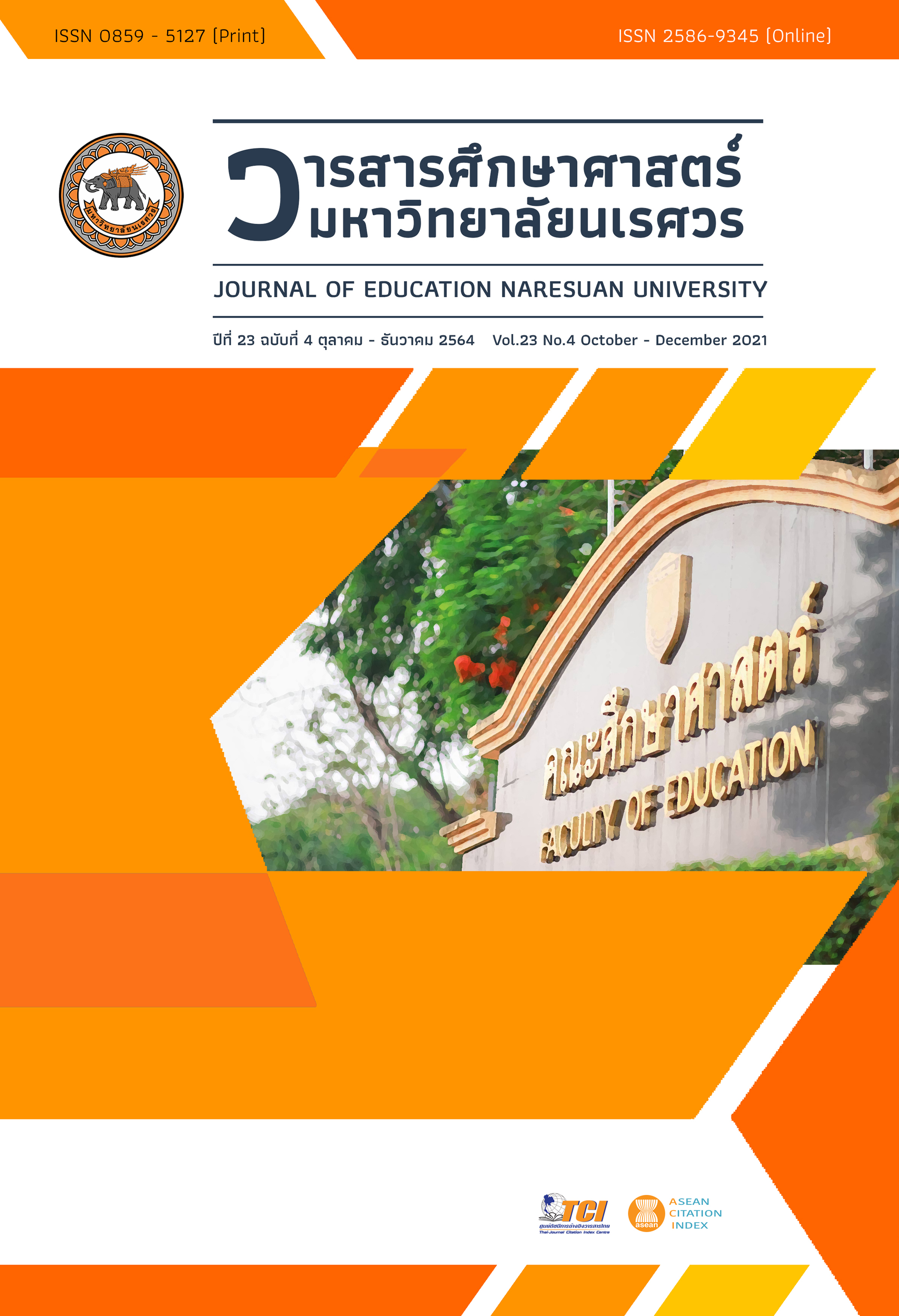THE ASSESSMENT OF MUSIC SKILLS FOR HIGHER EDUCATION การประเมินทักษะทางดนตรีระดับอุดมศึกษา
Main Article Content
Abstract
In this article, the author studies the process of measuring and evaluating tertiary musical skills which emphasizes on the authentic assessment, the assessment in the real situation. The study explores many issues including 1) The assessment which should focus on the assessment for learning and development more than the assessment of learning or summative assessment; 2) The instruction of higher education which should cover all domains, including Cognitive domain, Phycho-monitor domain and Affective domain, to prepare students for applying comprehensive skills in the future career; 3) The assessment in higher education should be relevant to the objectives of instruction and learning orders and also lead to the improvement of both the instructors and the students; 4) The authentic assessment purposes the students to express their behaviors through complex thinking process by integrating music skills and knowledge to be a guideline and benefit in the development of music teaching and learning to be more effective.
Article Details
The owner of the article does not copy or violate any of its copyright. If any copyright infringement occurs or prosecution, in any case, the Editorial Board is not involved in all the rights to the owner of the article to be performed.
References
Adams, N. E. (2015). Bloom's taxonomy of cognitive learning objectives. Journal of the Medical Library Association, 103(3), 152–153.
Bharuthram, S., & Patel, M. (2017). Co-constructing a rubric checklist with first year university students: A self-assessment tool. Apples – Journal of Applied Language Studies, 11(4), 35–55.
Bone, Z. (2014). Using a learning contract to introduce undergraduates to research projects. The Electronic Journal of Business Research Methods, 12(2), 121-130.
Brophy, T. S. (2019). The Oxford handbook of assessment policy and practice in music education. New York: Oxford University Press.
Buathong, S. (2017). Measurement and assessment of learning skills in the 21st century. Veridian E-Journal, Silpakorn University, 10(2), 1856-1867. [in Thai]
Chaoarun, A. (2012). Proposed guidelines for developing measurement and assessment in basic keyboard courses for undergraduate music programs in public higher education institutes in Bangkok and Vicinity (Master thesis). Bangkok: Chulalongkorn University. [in Thai]
Denis, J. M. (2018). Assessment in music: A practitioner introduction to assessing students. Update Applications of Research in Music Education, 36(3), 20–28. https://doi.org/10.1177/8755123317741489
Dunbar, L. (2016). Embedding technology and assessment into the music classroom with Nearpod. General Music Today, 29(3), 33–37.
Frey, B. B., Schmitt, V. L., & Allen, J. P. (2012). Defining authentic classroom assessment. Practical Assessment Research and Evaluation, 17(2), 1-18. https://doi.org/10.7275/sxbs-0829
Frey, B. B. (2014). Modern classroom assessment. Kansas: SAGE Publications.
Fuller, J. A. (2014). Music assessment in higher education. Journal of Social Sciences, 2(6), 476-484.
Leung, C., Wan, Y., & Lee, A. (2009). Assessment of undergraduate students’ music compositions. International Journal of Music Education, 27, 250-268.
Madsen, C. K., Standley, J. M., Byo, J. L., & Cassidy, J. W. (1992). Assessment of effective teaching by instrumental music student teachers and experts. Applications of Research in Music Education, 10, 20-24.
Meearsa, J., & Suttachit, N. (2017). Guidelines the instruction management of classical saxophone practical skills course in music program, bachelor degree. An Online Journal of Education, 12(4), 157-168. [in Thai]
Mhlauli, M. B., & Kgosidialwa, K. (2016). The use of a portfolio to enhance authentic assessment among in-service student-teachers’ in social studies education at the University of Botswana. Journal of Education and Human Development, 5(3), 84–96.
Nichols, B. E. (2017). Constructing singing assessments for the music classroom. General Music Today, 30(3), 13–17.
Onsri, P. (2015). The instructor’s role towards 21st century learning skills. Journal of The Royal Thai Army Nurses, 16(3), 8-13. [in Thai]
Palomba, C. A., & Banta, T. W. (1999). Assessment essentials: Planning, implementing, and improving assessment in higher education. San Francisco: Jossey-Bass Publishers.
Payne, P. D., Burrack, F., Parkes, K. A., & Wesolowski, B. (2019). An emerging process of assessment in music education. Music Educators Journal, 105(3), 36–44.
Ritjaroon, P. (2012). Principles of educational measurement and evaluation (7th ed.). Bangkok: House of Kermyst. [in Thai]
Sisiadngam, W, Kaenampornpan, P., & Vilailuck,S. (2019). Authentic assessment of the musical instrument practice course in higher education. Journal of Educational Measurement Mahasarakham University, 25(1), 16-27. [in Thai]
Scott, S. (2004). Evaluating tasks for performance-based assessments: Advice for music teachers. General Music Today, 17(2), 17-21.
Suttachit, N. (2012). Music education: Principles and essences (9th ed.). Bangkok: Chulalongkorn University Press. [in Thai]
Taebel, D. K. (1990). An assessment of the classroom performance of music teachers. Journal of Research in Music Education, 38, 5-23.
Tyler, R. W. (1970). Basic Principle of curriculum and instruction. Chicago: University of Chicago Press.
Wesolowski, B. C. (2012). Understanding and developing rubrics for music performance assessment. Music Educators Journal, 98(3), 36–42.
Wesolowski, B. C. (2015). Tracking student achievement in music performance: Developing student learning objectives for growth model assessments. Music Educators Journal, 102(1), 39–47.
Whitlock, B., & Nanavati, J. (2013). A systematic approach to performative and authentic assessment. Reference Services Review, 41(1), 32-48.
Wiggins, J. (2001). Teaching for musical understanding. Boston: McGraw Hill.
Yamaphat, S. (2007). The study of dimension and model of performance evaluation used balanced scorecard: A case study office of the permanent secretary ministry of commerce (Master thesis). Bangkok: Kasetsart University. [in Thai]


